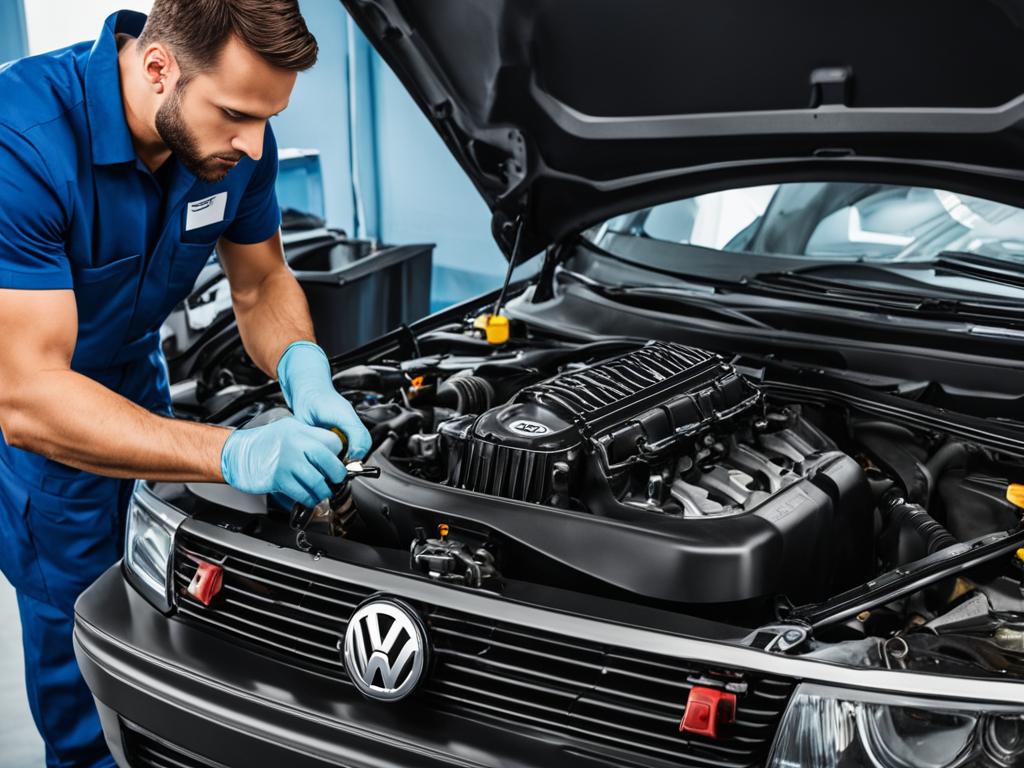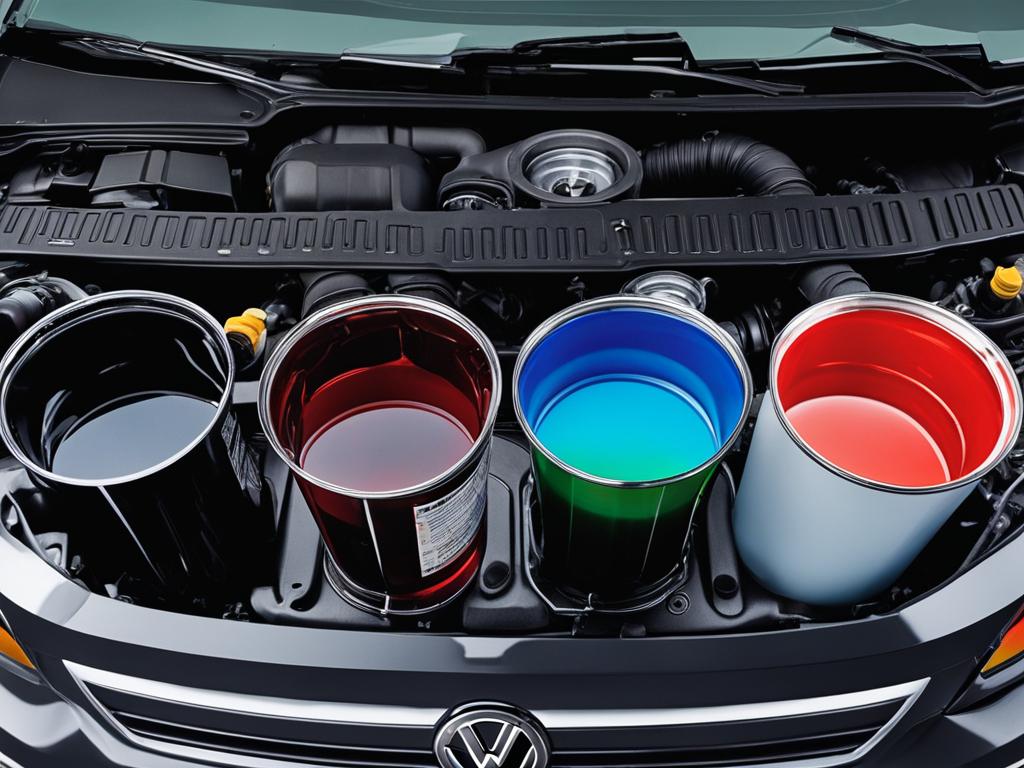Volkswagen Oil Change Essentials & Tips
Volkswagen is a premium vehicle that requires routine maintenance to boost performance and extend its lifespan. One crucial maintenance task is the oil change. The engine oil in Volkswagen cars should be changed at regular intervals according to the manufacturer’s recommendations. Signs that it’s time for an oil change include dirty engine oil, grinding sounds, and the illuminated dashboard light.
Key Takeaways:
- Regular oil changes are essential for maintaining the health and performance of your Volkswagen car.
- Dirty engine oil, grinding sounds, and illuminated dashboard lights are signs that it’s time for an oil change.
- Find a reliable and professional oil change service provider near you with expertise in Volkswagen cars.
- The cost of an oil change can vary, so compare prices and choose an option that fits your budget.
- Look for coupons and discounts to save on your Volkswagen oil change service.
Signs that it’s time for an oil change in your Volkswagen
Regularly checking the engine oil in your Volkswagen is crucial to determine when an oil change is needed. Ignoring this maintenance task can lead to engine problems and decreased performance. Here are some signs to look out for that indicate it’s time for an oil change:
- Dirty engine oil: When the engine oil appears dark and gritty, it is a clear sign that it is dirty and no longer providing optimal lubrication. Dirty oil can lead to increased friction and overheating in the engine, potentially causing damage.
- Low engine oil level: If you notice that the engine oil level is consistently low, it may indicate a leak or excessive oil consumption. Low oil levels can result in inadequate lubrication, leading to engine wear and potential damage.
- Grinding sounds: Unusual grinding or knocking sounds coming from the engine can be a sign of insufficient lubrication. This could be caused by old, dirty oil that can no longer properly protect engine components.
- Dashboard oil light: The illuminated oil light on the dashboard is a clear indication that the engine oil needs attention. Ignoring this warning can lead to severe engine damage and costly repairs.
Being attentive to these warning signs and promptly addressing them by scheduling an oil change can help maintain the performance and longevity of your Volkswagen.
Here’s an image highlighting the importance of checking your engine oil regularly:
Takeaway:
Regularly checking and addressing the signs of dirty engine oil, low oil level, grinding sounds, and the illuminated oil light can help you determine when it’s time for an oil change in your Volkswagen. Ignoring these signs can lead to engine problems and decreased performance.
Importance of Regular Oil Changes for Volkswagen Cars
Regular oil changes are essential for maintaining the health and performance of your Volkswagen car. By adhering to the manufacturer’s recommendations and scheduling oil changes at the recommended intervals, you can enjoy several benefits that contribute to the longevity and smooth operation of your vehicle.
Lubrication and Friction Reduction
One of the primary functions of engine oil is to lubricate the various moving components inside your Volkswagen’s engine. This lubrication helps reduce friction between the metal parts, preventing excessive wear and tear. Regular oil changes ensure that the engine is always supplied with clean and fresh oil, optimally lubricating the internal components and minimizing friction.
Engine Temperature Regulation
Engine oil also plays a crucial role in regulating the temperature of your Volkswagen’s engine. The oil absorbs heat generated during engine operation, preventing overheating and helping to maintain an optimal operating temperature. Over time, engine oil can become contaminated with debris and lose its ability to regulate temperature effectively. Regular oil changes ensure that the oil remains clean and capable of effectively managing engine temperature.
Enhanced Engine Performance
Regular oil changes contribute to improved engine performance in your Volkswagen. Clean oil allows the engine to operate smoothly, promoting better fuel efficiency and power output. Additionally, the reduced friction resulting from fresh oil helps prevent engine strain and promotes smoother acceleration and overall performance.
By neglecting oil changes, you run the risk of using dirty, degraded oil that can lead to significant engine damage. Over time, contaminated oil can cause excessive wear on engine components, decreased performance, and even engine failure. The cost of repairing or replacing an engine far outweighs the expense of routine oil changes.
Ensure you prioritize regular oil changes for your Volkswagen to protect your investment, maintain optimal engine performance, and enjoy a smooth and efficient driving experience.

Finding a Volkswagen oil change service near you
When it’s time for an oil change, finding a reliable and professional service provider near you is essential. Look for local oil change service providers that specialize in Volkswagen cars to ensure that the job is done correctly.
Choosing a local service provider offers several advantages. Firstly, they are conveniently located, saving you time and effort. Additionally, local oil change service providers are familiar with the specific needs of Volkswagen cars and have the expertise and knowledge required to perform the oil change properly.
Furthermore, opting for a professional oil change service guarantees that your Volkswagen is in good hands. These providers have experienced technicians who understand the intricacies of Volkswagen models and can ensure that the oil change is performed to the manufacturer’s specifications.
Be sure to do thorough research and read customer reviews to find reputable and trustworthy oil change service providers in your area. Taking the time to find the right professional oil change service will help maintain the performance and longevity of your Volkswagen.
Volkswagen oil change costs and options
When it comes to getting an oil change for your Volkswagen, the cost can vary depending on several factors. These factors include your location, the specific service provider you choose, and the type of oil used during the oil change.
Synthetic oil changes may be slightly more expensive compared to conventional oils, but they offer additional benefits such as enhanced performance and better engine protection. Synthetic oil can withstand higher temperatures and resists breaking down over time, resulting in improved lubrication and reduced wear on engine components.
When considering your oil change options, it’s important to compare prices and choose an option that fits your budget while meeting the manufacturer’s recommendations. While affordability is important, it’s equally crucial to prioritize the health and performance of your Volkswagen.
| Oil Change Option | Cost Range | Benefits |
|---|---|---|
| Conventional Oil Change | Affordable | Basic engine protection |
| Synthetic Blend Oil Change | Moderate | Enhanced engine protection |
| Synthetic Oil Change | Higher cost | Superior engine performance and protection |
Opting for a synthetic oil change can be a worthwhile investment, especially if you prioritize the long-term health and performance of your Volkswagen. However, it’s essential to consult your vehicle’s owner’s manual or speak with a knowledgeable service consultant to understand the manufacturer’s recommended oil type and change interval for your specific Volkswagen model.
By choosing an oil change option that suits your needs, you can ensure that your Volkswagen’s engine remains well-lubricated and protected, contributing to its longevity and reliable performance.

Expert Tip:
Consider the long-term benefits when comparing oil change costs for your Volkswagen. While synthetic oil changes may have a higher initial cost, they offer superior engine performance and protection, potentially reducing the risk of costly repairs down the road.
Volkswagen Oil Change Coupons and Discounts
Looking to save on your Volkswagen oil change? Take advantage of the various coupons and discounts available for oil change services at reputable service providers and Volkswagen dealerships. These offers can help you reduce the overall cost of the service, allowing you to enjoy savings on your oil change.
By using oil change coupons, you can access discounted rates and special promotions specifically designed for Volkswagen owners. These coupons often include discounts on labor, oil, and other related services. Keep an eye out for seasonal promotions and special events, as service providers may offer additional discounts during these periods.
Additionally, consider checking the websites or newsletters of Volkswagen dealerships in your area, as they often provide exclusive deals and discounts for Volkswagen service customers. These discounts can further contribute to significant savings on your oil change.
When utilizing oil change coupons and discounts, make sure to compare offers from different service providers to find the best deal. Pay attention to any specific terms and conditions, such as expiration dates or limitations on the number of times the coupon can be used.
Remember, taking advantage of oil change coupons and discounts not only helps you save money but also ensures you can properly maintain your Volkswagen without compromising on quality service. Keep your vehicle running smoothly and efficiently while enjoying the benefits of cost savings.
Benefits of Using Oil Change Coupons and Discounts for Volkswagen
There are several benefits of utilizing oil change coupons and discounts specifically tailored for Volkswagen owners:
- Cost Savings: Using coupons and discounts allows you to reduce the overall cost of your Volkswagen oil change, making it more affordable and budget-friendly.
- Preserving Warranty: Regular oil changes are often a requirement to maintain the warranty on your Volkswagen. By taking advantage of discounts and coupons, you can fulfill the warranty obligations without overspending.
- Quality Service: Coupons and discounts are often offered by certified service providers or Volkswagen dealerships, ensuring that your oil change is performed by professionals who understand the specific needs of your vehicle.
- Access to Additional Services: Some coupons or discounts may include complimentary services or discounted rates on other maintenance tasks, providing you with more value for your money.
Don’t miss out on the opportunity to save on your Volkswagen oil change. Look for coupons and discounts, and schedule your service to take advantage of these cost-saving offers.
Testimonials
“I regularly search for oil change coupons for my Volkswagen, and it’s amazing how much I can save. It allows me to keep up with the recommended maintenance without breaking the bank.” – Sarah
“Using coupons and discounts for my Volkswagen oil change has been a game-changer. I never thought I could save so much while still receiving high-quality service.” – Michael
How often should you change the oil in your Volkswagen?
The frequency of oil changes for Volkswagen cars can vary depending on the model and engine type. To determine the recommended oil change interval for your Volkswagen, it is best to consult the owner’s manual or speak with a knowledgeable service consultant. They can provide you with specific guidelines tailored to your vehicle’s needs.
Factors that influence oil change frequency
- Driving conditions: Your driving habits and the conditions in which you drive can impact the frequency of oil changes. If you frequently drive in stop-and-go traffic or engage in heavy towing, your Volkswagen may require more frequent oil changes.
- Oil type: The type of oil used in your Volkswagen can also affect the recommended change interval. Synthetic oils typically last longer than conventional oils and may require less frequent changes.
- Manufacturer recommendations: Volkswagen provides a maintenance schedule for each model, outlining the recommended oil change intervals. Adhering to these guidelines can help ensure optimal performance and longevity for your vehicle.
Regular oil changes are key to maintaining the health of your Volkswagen’s engine. Fresh oil helps lubricate the moving parts, reducing friction and preventing premature wear. It also helps to remove contaminants and regulate engine temperature, optimizing performance and fuel efficiency.
Proper oil change intervals play a vital role in Volkswagen maintenance, ensuring that your vehicle continues to deliver a smooth and reliable driving experience. By following the manufacturer’s recommendations and consulting with trusted professionals, you can stay on top of your Volkswagen’s oil change needs and keep your engine running efficiently.

| Model | Engine Type | Recommended Interval |
|---|---|---|
| Golf | Gasoline | Every 10,000 miles or 1 year |
| Passat | Diesel | Every 7,500 miles or 1 year |
| Tiguan | Gasoline | Every 10,000 miles or 1 year |
| Atlas | Gasoline | Every 10,000 miles or 1 year |
Importance of changing the oil in your Volkswagen
Changing the oil in your Volkswagen is crucial for maintaining proper engine lubrication and protection. Fresh oil plays a vital role in ensuring that all engine components are properly lubricated, reducing friction and preventing damage.
Regular oil changes are not just a routine task but rather a form of preventive maintenance that significantly contributes to the long-term health and performance of your Volkswagen. By adhering to the manufacturer’s recommendations and scheduling oil changes at the appropriate intervals, you can safeguard your engine and extend its lifespan.
Engine lubrication is essential as it allows the moving parts within the engine to work harmoniously without excessive friction. Without proper lubrication, the metal components can rub against each other, leading to increased wear and tear, reduced efficiency, and, over time, costly repairs.
Moreover, fresh oil acts as a protective barrier, shielding the engine against harmful contaminants and particles that can cause damage. As the oil circulates throughout the engine, it collects dirt, dust, and debris, preventing these particles from settling on crucial components. Regular oil changes ensure that the contaminants are effectively removed, maintaining the engine’s cleanliness and preventing potential issues.
Did you know? Neglecting oil changes can result in the formation of sludge, which is a thick and sticky residue that can clog the engine and restrict the flow of oil. This sludge buildup not only hampers engine performance but can also lead to overheating, reduced fuel efficiency, and even engine failure.
Ultimately, oil changes are an integral part of preventive maintenance for your Volkswagen. Routine oil changes not only optimize engine lubrication but also contribute to better fuel economy, smoother operation, and improved overall performance. By prioritizing oil changes, you are investing in the longevity and reliability of your Volkswagen.

Tips for Maintaining Your Volkswagen’s Performance
To maximize the lifespan of your Volkswagen and ensure its performance remains at its best, regular maintenance is essential. By following these Volkswagen maintenance tips, you can keep your vehicle running smoothly for years to come:
- Check and Change the Oil: Regularly inspect the engine oil level and quality. Dirty or low oil can lead to engine damage and decreased performance. Change the oil according to the manufacturer’s recommended intervals, using high-quality oil suitable for your Volkswagen model.
- Replace Air and Cabin Filters: Clean and efficient air and cabin filters contribute to better performance and air quality in your Volkswagen. Replace these filters regularly to ensure proper airflow and prevent dust and pollutants from entering the cabin.
- Maintain Fuel and Brake Systems: A well-maintained fuel system ensures optimal engine performance. Use quality fuel and consider periodic fuel system cleaning. Additionally, inspect and service your brake system regularly to ensure safe driving and maintain performance.
- Inspect Spark Plugs: Spark plugs are vital for efficient combustion in your Volkswagen’s engine. Regularly inspect and replace worn-out spark plugs to maximize fuel efficiency and maintain smooth engine operation.
- Adhere to Recommended Maintenance Schedules: Follow the manufacturer’s recommended maintenance schedules for timing belt replacement, transmission service, and coolant/antifreeze replacement. These services are crucial for preserving your Volkswagen’s performance and protecting its vital components.
By incorporating these maintenance tips into your routine, you can ensure that your Volkswagen remains in optimal condition, delivering the performance and longevity you expect from your vehicle.
The role of fluids in Volkswagen maintenance
Proper fluid maintenance is crucial for ensuring the optimal performance and longevity of Volkswagen cars. Each fluid in a Volkswagen, including brake fluid, coolant, and oil, has specific requirements that must be met to maintain the vehicle’s health and functionality.
Using the correct, specialized fluids suited for Volkswagen cars is of utmost importance. These fluids are specifically designed to meet the unique needs of Volkswagen vehicles, providing them with the necessary lubrication, cooling, and protection.
For example, the brake fluid used in a Volkswagen must have specific properties to withstand the high temperatures generated during braking and maintain the brake system’s effectiveness. Similarly, the coolant is formulated to regulate the engine’s temperature, preventing overheating and ensuring optimal performance.
When it comes to engine oil, using the recommended oil type and changing it at the recommended intervals is essential. Volkswagen cars often require synthetic oil, which offers superior performance, protection, and lubrication for the engine.
Proper fluid maintenance ensures that all the vital components of a Volkswagen work together harmoniously, reducing the risk of costly repairs and maximizing the vehicle’s lifespan.
| Fluid | Importance | Specific Needs | Specialized Fluid |
|---|---|---|---|
| Brake Fluid | Ensures effective braking | High-temperature resistance | Volkswagen-approved brake fluid |
| Coolant | Regulates engine temperature | Heat transfer and corrosion protection | Volkswagen-approved coolant |
| Engine Oil | Provides lubrication and protection | Synthetic oil for enhanced performance | Volkswagen-recommended synthetic oil |

Maintenance tasks beyond oil changes for your Volkswagen
In addition to regular oil changes, there are other maintenance tasks that are essential for keeping your Volkswagen in top condition. By performing these additional tasks, you can extend the life of your vehicle and ensure optimal performance. Two important maintenance tasks to consider are tire rotation and sunroof drain cleaning.
Tire Rotation
Tire rotation is a critical maintenance task that helps to evenly distribute the wear on your tires. During tire rotation, the position of each tire is changed to ensure that they wear down at a similar rate. This not only extends the lifespan of your tires but also improves overall traction and handling. It is recommended to have your tires rotated every 5,000 to 7,500 miles or as specified in your Volkswagen owner’s manual.
Sunroof Drain Cleaning
Cleaning the sunroof drains is another important task that often gets overlooked. Over time, debris such as leaves, dirt, and twigs can accumulate in the sunroof drains, causing blockages. These blockages can lead to water leaks and potential damage to your vehicle’s interior. To prevent this, it is recommended to clean the sunroof drains regularly. You can use a soft brush or compressed air to remove any debris and ensure that the drains are clear.
By performing these additional maintenance tasks, tire rotation and sunroof drain cleaning, you can enhance the longevity and performance of your Volkswagen. Don’t forget to consult your owner’s manual or a trusted service provider for specific guidelines and recommendations for your vehicle.

Conclusion
Regular oil changes are an essential part of Volkswagen maintenance, promoting optimal engine performance and ensuring the longevity of your vehicle. By following the manufacturer’s recommendations and scheduling oil changes at the appropriate intervals, you can keep your Volkswagen running smoothly for years to come. It is crucial to consult a trusted service provider specializing in Volkswagen maintenance to ensure that the oil change is performed correctly and efficiently.
In addition to oil changes, it is important to adhere to routine maintenance tasks such as replacing air and cabin filters, inspecting spark plugs, maintaining fuel and brake systems, and following recommended maintenance schedules for timing belts, transmission service, and coolant/antifreeze replacement. These maintenance practices contribute to maximizing your Volkswagen’s lifespan and maintaining its peak performance.
Remember to use the recommended specialized fluids for your Volkswagen, such as brake fluid, coolant, and oil. The right fluids are critical for optimal performance and longevity of your vehicle. Taking care of your Volkswagen’s fluid needs and adhering to regular maintenance practices will ensure that your car continues to deliver a superior driving experience.
FAQ
What are the signs that it’s time for an oil change in your Volkswagen?
Signs that it’s time for an oil change include dirty engine oil, grinding sounds, and the illuminated dashboard oil light.
Why are regular oil changes important for Volkswagen cars?
Regular oil changes are essential for maintaining the health and performance of a Volkswagen car. Clean oil improves engine lubrication, regulates temperature, and enhances overall performance.
How can I find a Volkswagen oil change service near me?
Look for local oil change service providers specializing in Volkswagen cars to ensure they have the expertise and knowledge to perform the oil change correctly.
How much does an oil change for a Volkswagen cost?
The cost of an oil change for a Volkswagen can vary depending on factors such as location, service provider, and type of oil used. Synthetic oil changes may be slightly more expensive but offer enhanced performance and protection.
Are there any coupons or discounts available for Volkswagen oil changes?
To save on your Volkswagen oil change, look for coupons and discounts offered by service providers or Volkswagen dealerships. These coupons can help reduce the overall cost of the service and make it more affordable.
How often should I change the oil in my Volkswagen?
The frequency of oil changes for Volkswagen cars can vary depending on the model and engine type. It is recommended to consult the owner’s manual or speak with a knowledgeable service consultant to determine the specific oil change interval for your Volkswagen.
Why is changing the oil in my Volkswagen important?
Changing the oil in your Volkswagen is crucial for proper engine lubrication and protection. Fresh oil ensures that all engine components are properly lubricated, reducing friction and preventing damage.
What are some tips for maintaining my Volkswagen’s performance?
To keep your Volkswagen running smoothly and in great shape, follow these maintenance tips: regularly check and change the oil, replace air and cabin filters, maintain fuel and brake systems, inspect spark plugs, and adhere to recommended maintenance schedules for timing belts, transmission service, and coolant/antifreeze replacement.
What is the role of fluids in Volkswagen maintenance?
Proper fluid maintenance is essential for Volkswagen cars. Each fluid, such as brake fluid, coolant, and oil, has specific requirements to ensure optimal performance and longevity of the vehicle. Using the correct, specialized fluids suited for Volkswagen cars is crucial to maintain their health and functionality.
What other maintenance tasks should I consider for my Volkswagen?
In addition to regular oil changes, other maintenance tasks to consider for your Volkswagen include tire rotations to extend tire life and ensure proper traction, and cleaning of sunroof drains to prevent water damage to the vehicle’s interior.
What are the most important Volkswagen oil change essentials and tips?
To summarize, regularly changing the oil in your Volkswagen is crucial for maintaining engine performance and longevity. It’s important to find a reliable oil change service provider, consider the cost and options available, and follow the recommended oil change frequency. Additionally, proper maintenance beyond oil changes, such as checking fluids and performing necessary tasks, will help keep your Volkswagen in optimal condition.




